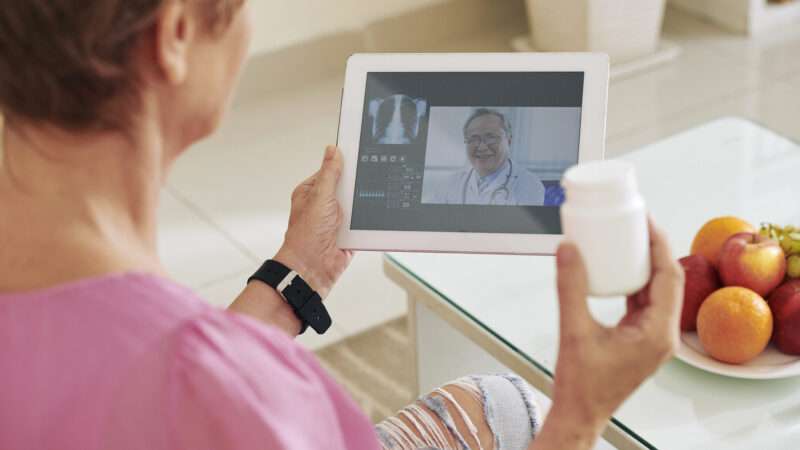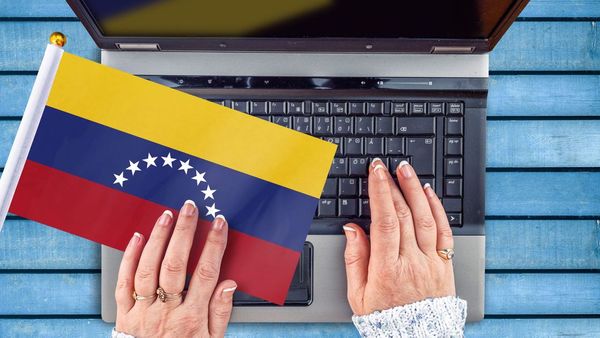
What if your medical conditions could be monitored from a distance to assess your health and adjust treatment plans based on real-time information? What if the same technology could be used to track your use of medications, such as opioids, to make sure you're not using them in frequencies and dosages frowned upon by bureaucrats who've never met you? You might already have guessed that it's that second implementation of the technology that interests politicians, who want to remotely monitor our body chemistry to stop us from getting high.
Big Brother Will See You Now
"Not later than 18 months after the date of enactment of this Act, the Comptroller General of the United States shall conduct a study and submit to the Committee on Energy and Commerce of the House of Representatives and the Committee on Health, Education, Labor, and Pensions and the Committee on Finance of the Senate a report on the use of remote monitoring with respect to individuals who are prescribed opioids," reads a small section inserted into the Support for Patients and Communities Reauthorization Act, which has 63 cosponsors in the House of Representatives. The program includes "identification of cohorts of individuals who stand to benefit the most from remote monitoring when prescribed opioids."
What a future our political leaders envision, in which high-tech snitches tell unblinking overlords about our use of painkillers—or any other health data they desire.
"A government‐sanctioned study like the proposed one by GAO will no doubt show that, given current or projected technologies, it is possible to remotely monitor how patients use opioids through their physiological responses," warn the Cato Institute's Jeffrey A. Singer, a senior fellow and general surgeon, and Patrick G. Eddington, a senior fellow in homeland security and civil liberties. "With such data in hand, misinformed anti‐opioid crusaders in Congress will then take the next 'logical' step — legislation requiring all patients prescribed opioids for any reason to be remotely monitored (another example of 'cops practicing medicine.')"
"This will intimidate health care practitioners into further curtailing opioid prescribing to their patients in pain," they add. "This simply exacerbates the misery that state and federal opioid prescribing policies have already inflicted on them that is driving many to suicide and some to homicide."
That pain is undertreated is beyond question. Last year, the Centers for Disease Control and Prevention (CDC) acknowledged that opioid guidelines have been inflexibly interpreted. The CDC emphasized that "some policies purportedly drawn from the 2016 CDC Opioid Prescribing Guideline have been notably inconsistent with it and have gone well beyond its clinical recommendations" resulting in "untreated and undertreated pain."
Physicians are leery of prescribing opioids for fear the DEA will target them and deprive them of their livelihoods and their freedom. Patients fear being labeled as drug-seekers and cut off from medication that lets them function. Remote real-time monitoring of body chemistry won't calm anybody's concerns about being second-guessed by bureaucrats. Resentment of and resistance to such intrusive surveillance is guaranteed given that diabetics have already told researchers that such monitoring is unwelcome.
Diabetics Don't Like Big Brother Either
"For people who equate remote digital monitoring with loss of autonomy over their diabetes management, digital health represents a step away from patient-centered care," Theodora Oikonomidi of the University of Paris and the Doctoral Network of the French School of Public Health wrote in 2021 about the results of a large international survey regarding diabetes monitoring. The more than 1,000 people surveyed didn't object to every sort of remote monitoring, but 40 percent of the monitoring scenarios that were presented were rated as "very or extremely intrusive." Respondents especially objected to food monitoring, real-time feedback from a physician, and private-sector data handling.
"Participants worried that giving their physician access to fine-grain data about their diabetes could lead to judgment and criticism by their physician if the captured data revealed 'poor' diabetes 'control' and nutrition habits," Oikonomidi wrote. "Participants wanted more control over monitoring settings, such as limiting which data they share with their physician."
If diabetes patients don't like feeling judged about meal choices and blood chemistry, imagine how pain patients will feel about constant surveillance of their fentanyl intake. Nobody likes being put under a microscope over the decisions they make for their own lives, and with pain patients the unseen officials peering through the microscope could impose coercive consequences affecting their health and liberty.
To their credit, the authors of the survey conclude that "shared decision-making could help patients identify the [remote digital monitoring] that best aligns with their values and lifestyle." They recognize that the potential benefits of such monitoring can be best realized if patients aren't pushed beyond their comfort levels. And there is real potential here. As Cato's Singer and Eddington point out, "technologies to remotely monitor blood pressure, EKGs, oxygenation, and more are either already available or soon will be. Private technology companies, funded by venture capital, continue to develop these devices, responding to the growing market for telehealth services."
Cops Practicing Medicine Taint Both Cops and Medicine
But that's not what politicians have in mind when they contemplate remote government monitoring of patients prescribed opioids to treat their pain. "The wording of the study language is too broad," point out Singer and Eddington. "It doesn't talk about remote monitoring for treating opioid use disorder or dependency, but just remote monitoring of patients on opioids." The implication is that every pain prescription will come with a requirement akin to the world's nosiest ankle bracelet, tracking not just location but medication use, with every popped pill second-guessed by a drug warrior at the other end of a telemetry chain.
Drug warriors threaten not just privacy, bodily autonomy, and doctor-patient relationships with such intrusive schemes; they also threaten the further development of promising medical technology. With diabetics already skittish about remote data monitoring and drug warriors potentially turning such monitoring into explicit surveillance of the most private areas of our lives, the whole field may become tainted as a manifestation of Big Brother in a lab coat. Cops practicing medicine can fuel resentment of not just cops, but also of medicine.
People need pain medication. And if some people use the same or similar medications for recreational purposes, or flat-out abuse such drugs to the detriment of their health, that's just part of life and probably unavoidable. As the CDC acknowledges, we have a problem with the undertreatment of pain. It's not worth exacerbating that problem, or turning the country into a medical surveillance state, in the vain hope that somehow the government will stop people from getting high.
The post If You Need Pain Pills, Politicians Want To Monitor Your Body Chemistry appeared first on Reason.com.







